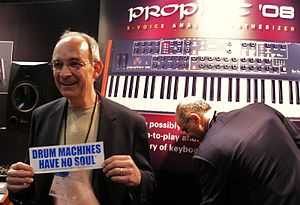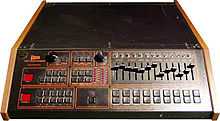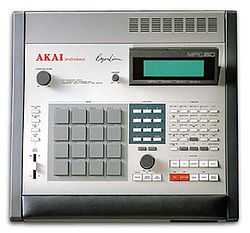Roger Linn

Roger Linn is an industrial designer, mainly of electronic drum machines, and has recently branched out into guitar effects pedals.[1] His products have become underground hits, being used on many famous recordings. Besides being an accomplished guitarist and producer, Roger Linn is also a member of the Dead Presidents Society, a group of distinguished innovators in the field of electronic music.[2]
The LM-1

In 1979, Roger Linn revolutionized the world of electronic musical instruments by designing the world's first drum machine to use digital samples, the LM-1 Drum Computer.[3] The LM-1 was the first drum machine to use samples of a real drum kit, though Roger Linn cannot recall exactly which session drummer played the sounds that he used.[3] To further add to the mystery, an entry in the online museum of the Roger Linn Design company credits L.A. session drummer Art Wood with most of the samples.[1] Examples of the LM-1 in use can be found on recordings by Prince, Gary Numan, and Michael Jackson.[1] Linn Electronics released two other designs after the LM-1: the LinnDrum and Linn 9000, which became synonymous with the music of the 1980s. The LinnDrum Midistudio was designed to be the successor to the 9000 but was never put into production.


Linn Electronics went out of business in 1986, at which point Linn was recruited by the Japanese company Akai to help in designing the MPC60, and later, the MPC3000.[1]
Roger Linn Design
As of 2001, Roger Linn has founded a new company, Roger Linn Design. RLD's products so far are the AdrenaLinn series of guitar pedals, now updated to a third version, and the LinnStrument music performance controller.
AdrenaLinn

The AdrenaLinn is a digital multi-effects unit with a drum machine and amp modeler all in one, designed by Roger Linn with some help from Dave Smith (credited with helping to conceive MIDI) and Tom Oberheim (designer of early analog synthesizers). Most notably, unlike other guitar pedals, the AdrenaLinn specializes in beat-synced effects, including modulation and delay but also a sequencer that provides looped patterns of filtered tones, all moving in sync to its internal drum machine or to midi. The drum section can also be affected by the filter section, allowing dance-style beats. Other unusual aspects of this pedal include note-triggered filter effects such as auto-wah, simulated talk box and guitar synthesizer sounds. The AdrenaLinn technology was also the basis of Roger Linn's partnership with M-Audio to create the Black Box guitar multi-effect and recording unit.[1]
The AdrenaLinn can be heard on the following records (among many others):
- John Mayer – "Heartbreak Warfare", from the 2009 album "Battle Studies", "Bigger Than My Body" from the 2003 album "Heavier Things" and "I Don't Trust Myself (With Loving You)" from the 2006 album "Continuum"
- Green Day – "Boulevard of Broken Dreams" from the 2004 album "American Idiot"
- Red Hot Chili Peppers – By The Way – Warner Bros. – 2002 (produced by Rick Rubin)
- Morcheeba – Parts Of The Process – Reprise Records – 2003
- Marillion – Marbles – 2004[4]
LinnDrum II

Roger Linn and Dave Smith announced co-development of a drum machine product, originally to be called BoomChik, but changed to LinnDrum II in December 2007, a reference to one of Linn's early popular drum machines: the LinnDrum. The LinnDrum II was renamed the Tempest, and co-released by Roger Linn Designs and Dave Smith Instruments in 2011.
LinnStrument
.jpg)
In late 2014 Linn released the LinnStrument, a music performance controller with 3D note expression, after several years of development. The grid based MIDI controller, playable with one or two hands, is velocity sensitive, but also senses three dimensions per finger, polyphonically.
Music career
Roger Linn has had a level of songwriting success, penning hits ("Promises", Eric Clapton 1979; "Quittin' Time", Lou Ann Barton 1986, Mary Chapin Carpenter 1991, Amy Bishop 2009), and having toured as a guitarist with the pianist/songwriter Leon Russell in the 1970s at age 21.[1]
In 2011 Roger was awarded a Grammy Award for Lifetime Technical Achievement, recognizing his many contributions to the music recording industry. This award was previously awarded to people such as Thomas Edison and Leo Fender.[5][6]
References
- ↑ 1.0 1.1 1.2 1.3 1.4 1.5 Roger Linn Design: About Roger Linn
- ↑ Dead Presidents Society
- ↑ 3.0 3.1 Hey, what's that sound: Linn LM-1 Drum Computer and the Oberheim DMX by David McNamee The Guardian
- ↑ Roger Linn Design: AdrenaLinn or AdrenaLinn II
- ↑ Rundgren, Todd (February 1, 2011). "Technical GRAMMY Award: Roger Linn". GRAMMY.com. Retrieved June 17, 2011.
- ↑ "Roger Linn at Special Merit Awards Ceremony & Nominees Reception". GRAMMY.com. February 13, 2011. Retrieved June 17, 2011.
External links
- Akaipro.com
- Roger Linn Design
- About Roger Linn; biography, video interview by Sweetwater Sound
- A BBC Radio 4 programme devoted to Roger Linn's drum machines.
- LinnDrum II
- LinnStrument
- The Linn 9000 Homepage
- Mr. MPC: Roger Linn
- Linn MidiStudio (a very early prototype of the MPC60)
- Auction on VEMIA listing the Linn MidiStudio
- Dead Presidents Society - Roger Linn Design
- Dead Presidents Society Discuss Equipment Design
- Dead Presidents Society - YouTube